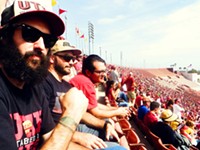Page 3 of 4
Stumping in Florida last August, Donald Trump curiously inquired whether any Utahns were in the crowd, perhaps to ask for tips to win over a state he had moments before deemed a "tremendous problem."
These are strange times. Crimson-red Utah has been casting its electoral votes for Republicans every general election since 1968, and only opted for the Democrat choice once in more than half a century—Lyndon B. Johnson in a 1964 landslide victory over Barry Goldwater. No modern presidential nominee has tested that streak to the degree that Trump has. Campaigns have set up shop here and dumped ad money across the airwaves. Pundits are pegging Utah as a toss-up.
Matthew Burbank, a political science professor at the University of Utah, says the amount of presidential attention this state is receiving is unusual. Trump bills himself as an unconventional candidate. He seems to put little preparation in his public remarks, his social-media exchanges are routinely criticized as inflammatory and he has no experience in the political arena. For people dissatisfied with Washington, the idea of sending an unfiltered tough-talker to shake up the system is appealing.
But fewer Utah voters seem won over by the bravado.
"Contrast that with [2012 presidential runner-up] Mitt Romney, who was very smooth, very polished," Burbank says. "Even when he's attacking, it's not bold or brash or outspoken."
Not only do those Utah Republicans consider Trump's bombastic persona off-putting, Burbank explains, but they also find it difficult to stomach the substance of his positions. He's proposed draconian immigration laws, suggesting a ban on Muslims from entering the country. Sen. Mike Lee, R-Utah, condemned the proposed religious entrance exam. As a member of the once-persecuted LDS faith, Lee alluded that such a requisite would be hypocritical.
Plenty of Republicans have openly supported Trump. A sizable number, though, have been unsure about the choice of their party, while others have occupied a nebulous space between a hearty endorsement and begrudgingly giving him their votes.
Before the release of a now-infamous video that captured Trump lecherously gloating about his unsolicited sexual advances, Gov. Gary Herbert was among the GOP that reservedly admitted he'd be voting for Trump.
At an October town hall forum, days before the video leaked, the incumbent governor waxed on about his disapproval of Democratic nominee Hillary Clinton when asked about the presidential race. Absent from Herbert's entire two-minute explanation was the name topping the Republican ticket. At that time, he still committed to voting for Trump.
"My loyalty really goes to policy and principle, and see what will help us turn Washington, D.C., around," he said. "The process is what the process is. My concern is that really practically speaking, it's a binary choice, and I cannot see myself supporting Hillary Clinton."
But Herbert changed his tune quickly once the tape caught in the news cycle, and he pulled his endorsement. At the second presidential debate, Trump apologized for the 11-year-old remarks, rationalizing his behavior as "locker room talk." By that time, a wave of Republicans had already bailed.
The Utah Republican party is resolute, however. While admonishing Trump's misgivings, the party is holding him up as a serviceable alternative to Clinton, who it characterizes as a shill for the establishment. Her presidency, a release states, would change the makeup of the U.S. Supreme Court, damage the domestic economy and leave the country vulnerable to attack.
Trump opponents find his apology disingenuous, particularly in light of numerous women who came forward and described Trump's predatory advances. Democrats used his most outlandish messages—at times racist, misogynistic or Islamophobic—as campaign fodder. Pro-Mike Weinholtz attack ads linked Herbert and Trump.
Peter Corroon, chairman of the Utah Democratic Party, says that although Clinton is not a perfect candidate, her values are more closely aligned with Utahns' than Trump's are. These include Clinton's longtime advocacy for expanding health-care coverage to children and families.
"In the big picture, Hillary Clinton more represents the issues that are important to Utahns," Corroon says.
He and Burbank believe Clinton is in play because two outsider candidates, Gary Johnson and Evan McMullin, are expected to siphon away Republican votes. The Utah Democratic Party is primarily focused on local races, however.
Many who have repudiated Trump are quick to correct those who might muddle their words as support for Clinton. A widely shared Deseret News op-ed that panned Trump and called for his resignation also quibbled with Clinton's positions. Burbank says she also lacks a ringing endorsement in the state.
At the recent debate between Mia Love and Doug Owens, moderator KUED-TV's Ken Verdoia exclaimed disbelief at both congressional candidates' glaring refusal to publicly endorse their party's nominee.
"Apparently, I missed the distribution of 10-foot-poles," he joked.
More by Colby Frazier
-
FLASHBACK 2014: Colin Wolf and Colby Frazier journey to Colorado for newly legalized marijuana.
Gone to Pot
- Oct 7, 2024
-
FLASHBACK 2014: Colin Wolf and Colby Frazier hail a uniquely Utah music memory
Today is the anniversary of Spanish Fork accidentally booking Rage Against the Machine and everyone losing their minds
- Sep 2, 2024
- More »
More by Dylan Woolf Harris
-
FLASHBACK 2016: Newly tenured Mexican American women model success for minorities on U of U campus.
Chicana Voices
- Mar 24, 2025
- More »
Latest in Cover Story
Readers also liked…
-
Women decry harassment and toxic culture at St. George auto dealership
Men at Work
- Oct 11, 2023
-
At 98, skiing legend Junior Bounous is still carving up the powder with a smile.
Singing Down the Slopes
- Apr 3, 2024











